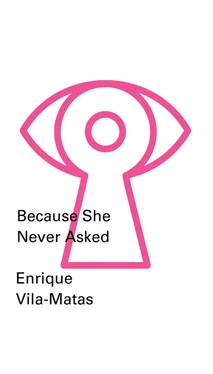Enrique Vila-Matas - Because She Never Asked
Здесь есть возможность читать онлайн «Enrique Vila-Matas - Because She Never Asked» весь текст электронной книги совершенно бесплатно (целиком полную версию без сокращений). В некоторых случаях можно слушать аудио, скачать через торрент в формате fb2 и присутствует краткое содержание. Год выпуска: 2015, Издательство: New Directions Publishing, Жанр: Современная проза, на английском языке. Описание произведения, (предисловие) а так же отзывы посетителей доступны на портале библиотеки ЛибКат.
- Название:Because She Never Asked
- Автор:
- Издательство:New Directions Publishing
- Жанр:
- Год:2015
- ISBN:нет данных
- Рейтинг книги:4 / 5. Голосов: 1
-
Избранное:Добавить в избранное
- Отзывы:
-
Ваша оценка:
- 80
- 1
- 2
- 3
- 4
- 5
Because She Never Asked: краткое содержание, описание и аннотация
Предлагаем к чтению аннотацию, описание, краткое содержание или предисловие (зависит от того, что написал сам автор книги «Because She Never Asked»). Если вы не нашли необходимую информацию о книге — напишите в комментариях, мы постараемся отыскать её.
Stranger on a Train
“Something strange happened along the way,” Vila-Matas wrote. “Normally, writers try to pass a work of fiction off as being real. But in
, the opposite occurred: in order to give meaning to the story of my life, I found that I needed to present it as fiction.”
Because She Never Asked — читать онлайн бесплатно полную книгу (весь текст) целиком
Ниже представлен текст книги, разбитый по страницам. Система сохранения места последней прочитанной страницы, позволяет с удобством читать онлайн бесплатно книгу «Because She Never Asked», без необходимости каждый раз заново искать на чём Вы остановились. Поставьте закладку, и сможете в любой момент перейти на страницу, на которой закончили чтение.
Интервал:
Закладка:
My real motive, should Sophie decide to answer, was to see whether a fax would be admitted into the collection of emails that were probably en route to becoming one of her hypothetical wall novels . I sent the message, and, as my mother said when my father went off to do the lengthy military service required in their day, bracing for the duration with no idea when he would be coming home, I sat down to wait . That’s just what I did over the following days: I sat down to wait, nesting at my desk at all hours without writing a thing, nothing more than waiting and thinking, thinking about a variety of subjects. I ruminated. I calculated, for example, how long it would take for spring to arrive and I remember telling myself things like: With the arrival of spring, one must be ironic; and I know that only by so being, I will survive the next season. Things like that, sometimes without much sense. Until the 16th of March came around, and off I went to the Hotel de Suède on Rue Vaneau, in Paris.
I had only been at the hotel a few hours when a fax from Sophie arrived, encouraging me to call her at home. My first reaction was a combination of happiness and annoyance. On the one hand, there was nothing I wanted more than her forgiveness, but, on the other, I thought of how aggravating the rebirth of this complicated relationship might be.
After much hesitation, I finally made up my mind to call her. The telephone rang three times. Someone picked up.
“It’s me… I’m…,” I babbled.
A brief silence. Followed by Sophie’s voice:
“Oh! You got my fax?”
“Yes, I’m here in Paris. Is everything well, Sophie?”
Another brief silence. And then she whispered these words:
“My mother died yesterday afternoon.”
It’s the last thing I expected to hear. I didn’t know whether to believe her or not. It seemed too much of a coincidence that her mother should wait until I got to Paris to die. I was at a loss. Finally, I mumbled a few words of condolence.
“Oh, come on,” she interrupted.
Another phone rang in Sophie’s house, probably her cell phone, and she asked me to “excuse her for a second.” I heard part of her conversation with the person who had called. She pronounced the word “funeral” several times, and it made me think that however unlikely it seemed, the truth about the death of her mother (which seemed like a beastly farce) was actually confirmed.
She hung up her cell phone and came back to our conversation, telling me the funeral would take place two days later in the cemetery of Montparnasse, and that it would be nice if I could come. The obituary would appear in Liberation on the day of the funeral. In any case, she added, now she had the time to see me. If I wanted, we could meet somewhere in Paris within the hour. In the Hotel de Suède, for example.
An hour and five minutes later, Sophie walked into the hall of the Hotel de Suède with a video camera and a broad smile. I was in the hall waiting for her. She ordered two coffees in reception, and although I didn’t want to see them, she showed me recent pictures of her dead mother and a copy of the peculiar obituary that would appear in Liberation two days later.
It didn’t take long for her to explain that following the experience with her mother, there was still one more obstacle between her and Pico Island. She had been invited to the Venice Biennale and needed time to prepare her show in this noteworthy exhibition. She was so sorry, but our project would have to be postponed. She had studied maps of the Azores and was also drawn to the idea of returning to Lisbon, a city she wasn’t very familiar with after all. It wasn’t a lack of interest in Rita Malu’s journey, on the contrary, she was very engaged with it, but the Venice Biennale was, as I must perfectly understand, of paramount importance to her.
Of course I understood perfectly, but there was a question hanging in the air that I didn’t hesitate to ask:
“When will you have time to live out ‘The Journey of Rita Malú?’”
“May of next year,” she said, without blinking.
My God! May 2007 seemed so far away. What was I going to do in the meantime?
“I’ve been waiting a long time, over eight years, to tackle this experience of living a story and I don’t mind waiting another year,” she added by way of explanation.
“Eight years?”
“Yes, eight years have passed since I first proposed the idea to Paul Auster. I can wait a little while longer, don’t you think?”
It seemed the perfect occasion to stage a break-up, to convey to her that by no means would I wait fourteen more months; so be it, our imaginary contract had come to an end. No way would I wait such a ridiculous amount of time!
But instead I was all smiles and resignedly docile.
We said our goodbyes at the door of the hotel an hour later and arranged to see each other again the following day, at the Salon du Livre, Porte de Versailles, where I would be signing copies of my latest novel. She would come to see me, she said, since it was near her home. I took my leave, and we both headed to our respective appointments, walking in opposite directions. I went to a friend’s party near Bastille Square, where I described a few details of my recent encounter with Sophie. A journalist from a magazine dedicated to rock music and literature heard my story and blurted: “Oh my God! She approached you about it, too?”
I didn’t really want to know what she meant by “you, too.” But I ended up saying, “Yes, she approached me, too.” Then I asked if she had approached anyone other than Paul Auster or Jean Echenoz. And yes, she had suggested the idea to two other writers. And, she had also approached Olivier Rolin.
The next day, I found out that there had been not just three more writers, but at least four. Just before I left Littré for the Salon du Livre, I received a call from a good friend of mine who was in Segovia, the writer and filmmaker Ray Loriga, who invited me to Madrid to participate in Carta Libre , an hour-long program on Spanish public television, on which he interviewed artists from his imaginary tribe. He wanted to invite Sophie and me as his guests, to talk about our project, he said. I asked him how he had found out about it, and he told me that Sophie had told him herself, they were longtime friends. She had made the same attractive proposition to him three years ago. He’d almost gone mad, he said, working relentlessly to move the seductive proposal forward; he’d come up against all sorts of peculiar glitches, including Sophie herself. Luckily for him, he hadn’t gotten so far as to write the story. My case was definitely much worse, since my story was already written and nothing had come of it.
How aggravating to discover that there had been more people invited to do the project before me, and I’d never been told about them. But I didn’t speak out and kept my anger to myself. I accepted Loriga’s invitation to his program, figuring that at least it would give me another opportunity to see Sophie, and more material to put into writing about my relationship with her, this holding pattern that was threatening to become eternal, as I awaited her decision to embark on the adventure: Rita Malú’s journey toward the encounter with my ghost.
.
8
Two hours later, I was signing copies of my novel in the Salon du Livre, when Sophie showed up with a friend whom she introduced as Florence Aubenas, that is, the famous journalist of Liberation, who had been kidnapped and then freed in Iraq. Though I had signed the petition for her release in Barcelona, I hadn’t seen photographs of her. So, inevitably, I doubted that this woman was the real Aubenas. Inertia led me to suspect that everything Sophie did was a bluff; she had lied to me about her mother and now she wanted to poke fun at me by introducing me to the fake Aubenas.
Читать дальшеИнтервал:
Закладка:
Похожие книги на «Because She Never Asked»
Представляем Вашему вниманию похожие книги на «Because She Never Asked» списком для выбора. Мы отобрали схожую по названию и смыслу литературу в надежде предоставить читателям больше вариантов отыскать новые, интересные, ещё непрочитанные произведения.
Обсуждение, отзывы о книге «Because She Never Asked» и просто собственные мнения читателей. Оставьте ваши комментарии, напишите, что Вы думаете о произведении, его смысле или главных героях. Укажите что конкретно понравилось, а что нет, и почему Вы так считаете.












